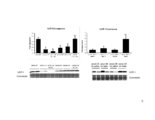| Title |
A role for central leptin signaling in maintaining myocardial fatty acid oxidation |
| Publication Type |
dissertation |
| School or College |
School of Medicine |
| Department |
Biochemistry |
| Author |
Black, Crystal L. |
| Date |
2010-12 |
| Description |
Leptin is a hormone produced by adipocytes that activates centralreceptors in the brain and peripheral tissues to decrease appetite and increaseenergy expenditure. Obesity is positively correlated with circulating leptin levels,indicating a state of "leptin resistance" in obese subjects. The relativecontribution of leptin resistance to heart disease is unknown. ob/ob and db/dbmice are commonly used to model the myocardial characteristics of obesepatients. They manifest myocardial hypertrophy, insulin resistance, alteredsubstrate utilization, mitochondrial dysfunction, and lipid accumulation. However, it is not clear which characteristics are direct consequences of impaired leptin signaling versus effects of obesity and hyperglycemia. Secondly, it is unknown if central leptin signaling plays a role in maintaining myocardial function and metabolism. These studies were designed to determine the contribution of central and peripheral leptin signaling to myocardial metabolism in ob/ob and db/db mice in the absence of the confounding effects of diabetes and obesity. 4-5 week old male ob/ob and db/db mice were caloric restricted by "pair feeding" to a leptin-treated group for 3 weeks. Other caloric restricted ob/ob mice were treated with systemic or central leptin by intracerebroventricular infusion for one week. In addition to determining glucose tolerance, lipid concentrations and body composition, substrate metabolism and insulin sensitivity were determined in isolated working hearts. Caloric restriction normalized glucose tolerance in ob/ob and db/db mice, but insulin levels remained modestly elevated. Despite normalizing body weight, fat mass and circulating lipid levels remained increased in caloric restricted ob/ob and db/db animals. Leptin-treatment and / or caloric restriction normalized heart weight in ob/ob and db/db mice. Palmitate oxidation remained elevated and insulin signaling remained impaired in caloric restricted ob/ob and db/db mouse hearts. Central leptin infusion was sufficient to normalize myocardial fatty acid oxidation (FAO) and expression of FAO genes while coordinately reducing circulating free fatty acid (FFA) concentrations in caloric restricted ob/ob mice. These data suggest that impaired central leptin signaling may contribute to altered myocardial metabolism in obesity, most likely by mediating PPAR-α ligand delivery to the heart. |
| Type |
Text |
| Publisher |
University of Utah |
| Subject |
Leptin Heart; Diseases; Physiological aspects Obesity; Physiological aspect |
| Subject MESH |
Receptors, Leptin; Leptin; Adipose Tissue ; Adipocytes; Obesity; Blood Glucose; Glucose Metabolism Disorders; Myocardium; Palmitates; Caloric Restriction; Oxidative Stress; Insulin; Cardiomegaly; Diabetic Cardiomyopathies; Glucose Transporter Type 4; Insulin Resistance; Phosphorylation; Diabetes Mellitus, Type 2; Body Composition; Energy Metabolism; Triglycerides; Adiponectin; Caloric Restriction; Hyperinsulinism; Homeostasis |
| Dissertation Institution |
University of Utah |
| Dissertation Name |
Doctor of Philosophy |
| Language |
eng |
| Relation is Version of |
Digital reproduction of A Role for Central Leptin Signaling in Maintaining Myocardial Fatty Acid Oxidation. Print version available at J.Willard Marriott Library Special Collections. |
| Rights Management |
© Crystal L. Black |
| Format |
application/pdf |
| Format Medium |
application/pdf |
| Format Extent |
2,169,789 bytes |
| ARK |
ark:/87278/s6xd4p0t |
| Setname |
ir_etd |
| ID |
1199996 |
| Reference URL |
https://collections.lib.utah.edu/ark:/87278/s6xd4p0t |
















































































































































